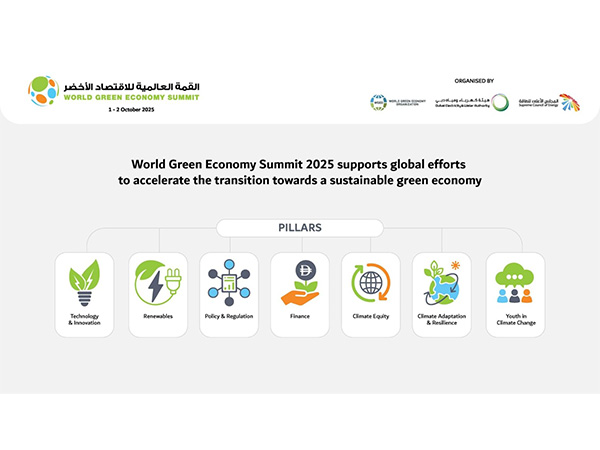Dubai [UAE], June 15 (ANI/WAM): Dubai Electricity and Water Authority (DEWA), the Dubai Supreme Council of Energy and the World Green Economy Organisation (WGEO) are organising the 11th World Green Economy Summit (WGES) on 1st and 2nd October at the Dubai World Trade Centre.
Gathering experts from a wide range of industries, countries, sectors and spheres of influence, WGES 2025 will be held under the theme ‘Innovating for Impact: Accelerating the Future of the Green Economy’ and will explore the most effective and innovative approaches to combat climate change.
The event will include a diverse array of participants, placing emphasis on empowering developing regions, fostering global co-operation, driving concrete action and strengthening public-private partnerships.
This year, WGES will prioritise crucial topics such as the energy transition, mitigation, adaptation, finance and innovation, organised around seven thematic pillars:
Technology and Innovation:
Sessions will explore how cutting-edge technology is driving climate resilience and sustainability, with a particular focus on artificial intelligence (AI) and smart innovations. Discussions will highlight how the Internet of Things (IoT) and AI-powered solutions optimise renewable energy integration, enhance predictive analytics for environmental risk mitigation and improve carbon emissions monitoring.
Additionally, the role of energy storage innovation and public-private collaboration in advancing green technologies will be examined, showcasing real-world AI-driven projects that align with long-term sustainability goals.
Clean and Renewable Energy Technologies:
As global energy demands surge, particularly with the rise of AI-driven data centres, this pillar explores innovative solutions to meet sustainability goals. Discussions will cover the role of peaceful nuclear energy in supporting round-the-clock clean power commitments for technology giants, and also focus on the viability and challenges of scaling up the green hydrogen economy, and the increasing demand for critical minerals essential for renewable energy and electrification.
With a focus on ethical sourcing, investment acceleration and technological advancements, these sessions will examine the pathway to a resilient and sustainable energy future, as well as discuss the latest developments in energy storage technologies.
Policy and Regulation:
These sessions will explore the dynamic shifts in climate policy and regulations, examining how competing priorities such as energy security, industrial policy and global competitiveness shape decision-making in key markets like the EU and the US. Discussions will highlight the resilience of renewable energy investments amid regulatory uncertainty, as well as the expansion of global carbon markets and their implications for trade and industry, and the evolving role of COP in advancing international climate agreements.
With a focus on policy alignment, private sector engagement and governance reforms, these sessions will assess the future of climate policy in driving sustainable economic growth.
Finance:
These sessions will explore the financial mechanisms driving the green transition, addressing key challenges in scaling up renewable energy deployment, financing climate solutions and ensuring credibility in carbon markets. Discussions will examine innovative strategies for overcoming barriers to renewable energy deployment, the evolving role of voluntary carbon markets in achieving net-zero goals, and how private sector investment aligns with international climate commitments.
By highlighting case studies, regulatory considerations and emerging financial instruments, these sessions will provide a road map for mobilising capital towards a resilient and sustainable global economy.
Climate Equity:
These sessions will focus on the disproportionate effects of climate change on vulnerable communities, particularly in the areas of health, food security and water access. Speakers will examine the increasing risks posed by extreme heat, air pollution and resource scarcity, while highlighting innovative solutions such as AI-driven smart farming, agrivoltaics and advanced water management technologies.
With an emphasis on sustainability, resilience and cross-border collaboration, these sessions will explore strategies to ensure equitable access to essential resources in a changing climate.
Climate Adaptation and Resilience:
These sessions will explore strategies to help societies adapt to the escalating effects of climate change while ensuring a just and equitable transition. Conversations will address the complexities of loss and damage, highlighting recovery efforts through nature-based solutions, early warning systems and resilience metrics.
Additionally, the role of climate justice in securing energy affordability, protecting vulnerable communities and balancing economic development with sustainability will be examined. Through innovative adaptation approaches and international collaboration, these sessions will focus on building a more resilient and fair future in the face of climate challenges.
Youth in Climate Action:
These sessions will explore the role of youths in driving climate solutions through technology, entrepreneurship and activism. Discussions will also address the growing demand for conscious and sustainable capitalism, highlighting the influence of younger generations in shaping a greener future. (ANI/WAM)
Disclaimer: This story is auto-generated from a syndicated feed of ANI; only the image & headline may have been reworked by News Services Division of World News Network Inc Ltd and Palghar News and Pune News and World News
HINDI, MARATHI, GUJARATI, TAMIL, TELUGU, BENGALI, KANNADA, ORIYA, PUNJABI, URDU, MALAYALAM
For more details and packages













